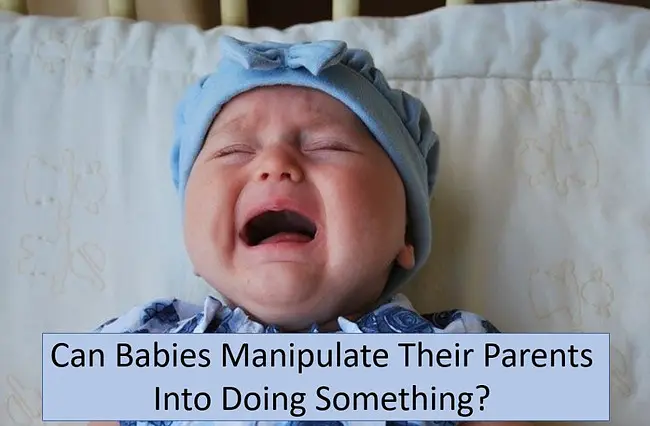Can Babies Manipulate Their Parents Into Doing Something?

Some parents feel manipulated by their baby’s excessive cries. They believe their babies won’t settle until they pick them up and soothe them in their arms.
But do babies really have the mental capability, awareness, and critical thinking ability to allow them to take advantage and control their parent’s behaviour?
The opinions vary between scientists.
What’s more, several studies demonstrate surprising results.
So, read on to find out if babies are truly capable of tricking their parents into doing something.
Can Babies Manipulate Their Parents Into Doing Something?
There is scientific evidence suggesting that babies as young as 4 months old are capable of some innocent forms of manipulation. It turns out that babies are purpose-driven. They do this because they want their mother to smile at them as long as possible. Other babies are able to fake their cries to draw their carer’s attention to them. Especially those who have siblings and need to compete for their parent’s notice. One thing is for sure. Parents should ALWAYS respond quickly to their baby’s crying to ensure the healthy development of their offspring.
1. Crying As A Form Of Communication For Babies
Some people say that if a parent responds to every cry by picking up and holding their baby, the little one will get spoiled.
Apparently, the baby will learn to control the parent’s behaviour and have them wrapped around their little finger.
However, studies have shown that this theory is far from true.
It is beneficial for the baby’s emotional and social development when the parent responds promptly to the baby’s cries.
As a result, babies feel safe, loved, and cared for. Which will help them to become confident and independent people later in life.
Being manipulative means that babies must be conscious and capable of making complex thoughts.
Which they are not.
Moreover, they simply cannot comprehend the cause and effect of actions at such young age.
Therefore, babies cannot really use crying to manipulate parents.
Crying is a baby’s way of communicating their very basic needs and emotional state. Because babies are utterly helpless when hungry, sick, need a nappy change, uncomfortable or tired. They cannot tell us what they need. So they cry to signal that something bothers them and they need attention right now. Not in 10 minutes – right now.
Moreover, they communicate with their instincts, not mindfully or intentionally. This is a big difference.
If a parent notoriously ignores the baby’s call, it will result in insecure attachment and increased production stress hormone – cortisol. And ultimately, it will harm their development.
And this is also precisely the reason why the “ cry it out method” to get a baby to sleep is not recommended by the experts.
Can I spoil my Baby and can they manipulate me?
2. Babies Can Make Their Moms Smile
Having said that, scientists from the University of California believe that babies can trick their caregivers into smiling at them without them smiling back.
So, they accomplish this goal by precisely timing their time smiling at the mom in a sophisticated manner, with the purpose to maximize the time of the mother only smiling.
So, the baby smile at the mother. Naturally, the mother’s response is to smile back at her precious one. This means that the baby has reached the goal and is no longer interested in smiling. The mother’s instinctive reaction to this is to carry on smiling with the anticipation to get the baby’s smile back at her.
I described these smiling games in my post Why Do Babies Smile As They Fart?
Now, in this particular study, such behavioural pattern of baby-mother interaction has been observed consistently in thirteen different babies aged from 4 to 17 weeks.
What’s more, these results were validated by the experiment that used a robot programmed to emulate the same smile pattern as babies.
The conclusion was that babies as young as 4 months old have a good grasp of sophisticated social communication and interaction. And they can indeed influence the behaviour of an adult and act in a purposive fashion, with clear goals.
Would you call it manipulation?
I wouldn’t in the context of the study. I find this word too strong and inappropriate, as it prompts a negative impression.
I think it is a rather charming objective, and I wouldn’t mind being a victim of such “deceit”.
*** As a side note, this discovery set a foundation for further analysis of social behaviour in children with an autism spectrum disorder. Which will hopefully shed some more light on their behaviour pattern.
.
3. Babies Can Fake Their Cry
According to a study carried out by Japanese scientists’ babies can fake their crying to manipulate their caregivers into “something”.
So how was the fake crying identified?
Well, apparently, the “discomfort crying” and “fake” or “intentional crying” are qualitatively very different.
Normally, when babies are genuinely upset, they exhibit a negative demeanour right before and after crying.
But it turned out that babies whose crying was identified by their moms as “fake”, or “attention-seeking” show no distress before and after an episode of crying.
Researchers also found that babies with siblings may be more likely to cry intentionally. That’s because they have to complete for their parent’s attention.
This deceptive behaviour emerges at quite an early stage – between 7 and 14 months.
So, how parents should react to deliberate crying, provided that baby is not really distressed and just want a parent’s attention?
Without a doubt, parents should always attend to their baby regardless of the crying intent. Because even if the crying is deliberate, it is still a very valid form of communication.
As a result, babies’ social and emotional development can only be enhanced by their parents’ responses to their needs.
4. Final Few Lines
The bottom line is baby’s brain is far too underdeveloped to plan and reason.
They certainly are not capable of malicious intention.
However, there is evidence of much more subtle methods of working the situation to their advantage and coercing parents into doing something. For example, babies can trick their parents into smiling at them. Or they can use different types of crying, such as intentional, attention-seeking crying, to get attention.
Regardless of the reason for crying, parents must always respond promptly to their children. Since babies cannot talk yet, crying is their primary means of communicating with adults.
